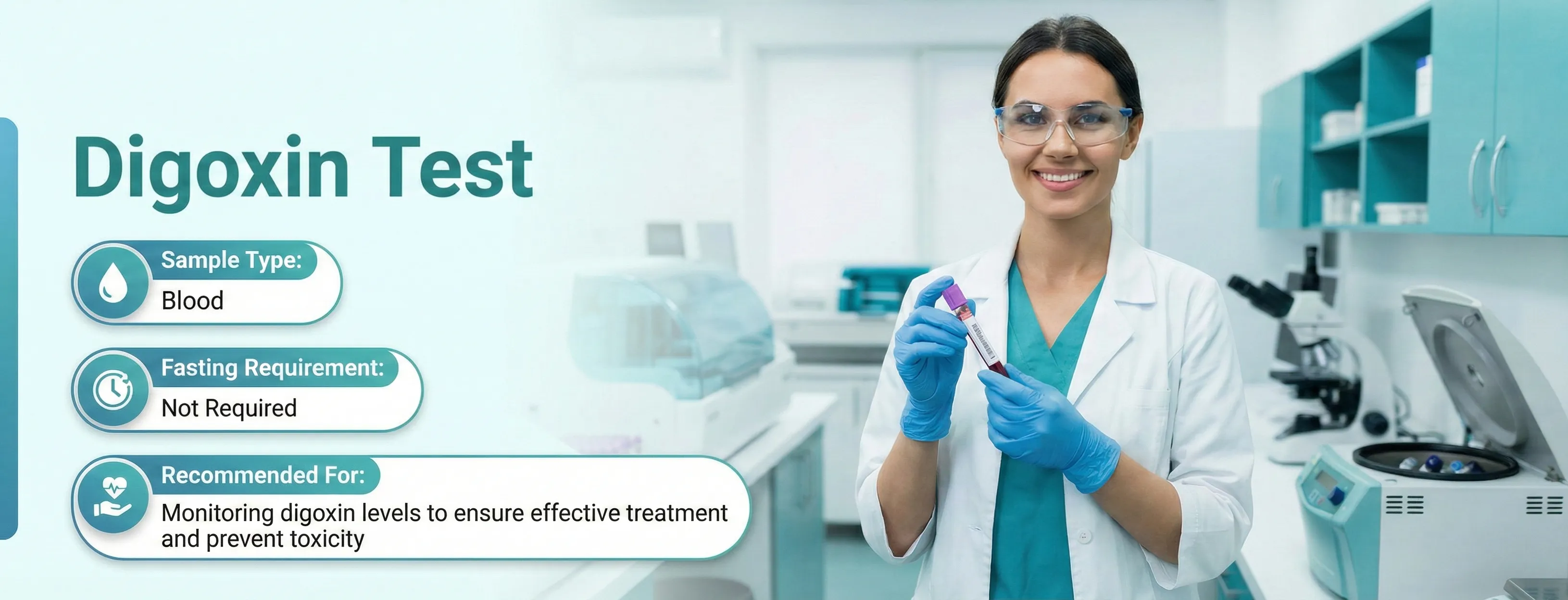1+ orders placed in your location
100% NABL & ISO Certified Lab • 100% Accurate Reports
Digoxin Test
Serum Digoxin Test, Dig level Test, Therapeutic Digoxin Monitoring
- SummaryThe Digoxin test measures the level of digoxin, a medication used to treat some disorders of heart like atrial fibrillation and heart failure. Monitoring ensures the medicine remains in the therapeutic range to avoid toxicity, which can cause serious side effects. The test is done using a blood sample, and fasting is not required. Read more
- Reports Within15 HrsView Sample Report100% NABL & ISO Certified Labs
- SampleBlood
- AgeAll Age Group
- FastingNot Required
PharmEasy Promises
Know More About The Test
A quick info on Digoxin Test
Overview
Digoxin test measures the level of the drug digoxin in the blood. Digoxin is a drug used for the treatment of heart failure and abnormal heartbeats. Heart failure, including congestive heart failure (CHF), occurs when the heart is less effective at pumping and circulating blood throughout the body.
This further results in backflow of the blood to the hands, legs, feet, liver and lungs. The symptoms of this flow back of blood are shortness of breath, swelling and fatigue.
Digoxin is generally prescribed to relieve some of the symptoms associated with heart failure. The drug helps strengthen the contractions of the heart muscles and helps the heart pump blood with greater efficiency.
Digoxin also helps control abnormal heart rhythms, a condition known as arrhythmia. However, it does not completely cure heart failure.
The digoxin values in blood need to be monitored closely because it has a narrow safety range. When the level of digoxin is too low, the symptoms may recur, while if the level of digoxin is high, it may lead to toxicity.
A digoxin test means checking the digoxin level in the blood and determining whether it falls within the safe range. Additionally, the dosage of digoxin is adjusted based on the levels reflected in the digoxin test reports.
The prevalence of heart disease and heart failure in India is quite high. About 1% of the population undergoes heart failure every year. However, heart transplants are becoming common nowadays, along with new drugs that help manage heart ailments.
Other names of digoxin test
- Therapeutic digoxin monitoring
- Dig level test
- Serum digoxin test
What does the digoxin test detect and who is it prescribed for?
The digoxin test is used to diagnose the level of digoxin in the blood. The digoxin test is prescribed for individuals undergoing digoxin therapy to ensure the correct dosage. The drug takes one to two weeks to reach a steady level in the heart and the blood. The digoxin test results help determine whether the correct amount of drug is being used. Once the dose is determined, routine monitoring is done to monitor if the level of the drug is steady in the blood.
A digoxin test may be prescribed if, after taking the drug, the following symptoms occur:
- Shortness of breath
- Oedema
- Fatigue
- Diarrhoea
- Vomiting
- Loss of appetite
- Difficulty in breathing
- Irregular heartbeat
- Dizziness
The digoxin levels change if there is a change in health status. Digoxin tests are done if an individual has the following health conditions:
- Kidney problem
- Cancer
- Stomach problem
- Thyroid problem
- Intestinal problem
The results of the digoxin test help the doctor to modify or use the same dosage of the drug for treating the symptoms of heart failure.
Risk Assessment
Dizziness, mental disturbance, nausea, vomiting
Ranges
Range of digoxin | Digoxin Test Result Interpretation |
0.5-0.9 ng/ml | The normal digoxin value for the treatment of heart failure |
0.5-2 ng/ml | The normal value for the treatment of heart arrhythmia |
Lesser than 0.5 ng/ml | Recurrence of symptoms of heart failure |
Greater than 4 ng/ml | Toxicity |
The digoxin test report readings can vary depending on the sex, test method, medical history and other conditions. If the results fall outside the normal range of the digoxin test, doctors might advise changing the dosage of the drug accordingly.
Test Result Interpretation
The digoxin test helps measure the level of the heart failure treatment drug digoxin in the blood. A high level of digoxin in the blood leads to toxicity, which can, in turn, lead to life-threatening conditions. Whereas, a low level of the drug leads to the recurrence of heart failure symptoms.
Doctors prescribe a digoxin test after an individual undergoes digoxin therapy to monitor the level of the drug in the body. The results of the digoxin blood test determine whether the level of digoxin is within the normal range. If the level is increased or decreased, doctors need to change the dosage of the drug.
The digoxin test is thus important for people undergoing digoxin therapy for a heart condition. Any changes in the level of the drug are harmful to the body and can be detected from several symptoms.
After the initial digoxin dosage is determined, patients undergoing digoxin therapy are advised to undergo regular tests for digoxin level monitoring to ensure the value of digoxin in the blood falls within the normal range.
Sample Test
The digoxin test requires blood samples to detect the level of digoxin in the blood. The blood sample may be drawn with the help of a needle from a vein in the arm.
Test Preparation
No special preparation is required for the digoxin blood test. However, the timing of sample collection is important. The blood must be drawn 6 to 8 hours after the last dose of digoxin. The person collecting the blood needs to know the time when the last dose was taken.
Some over-the-counter drugs such as antibiotics, antifungals or blood pressure medication can affect the level of digoxin. Therefore, in case someone is consuming these drugs, they must inform the doctor to ensure whether to stop or continue consuming these before the test.
Test inclusions: what parameters are included?
The only parameter that the digoxin test report includes is monitoring digoxin levels in the blood. The level of digoxin must be optimal in the blood for the treatment of heart failure. When the level of digoxin is low, it leads to the recurrence of the symptoms of heart failure, while a high digoxin level leads to toxicity.
How frequently should you take the test?
The digoxin test is not a routine test. A doctor prescribes the digoxin test of the blood after an individual is put on digoxin therapy. This helps regularly monitor the digoxin level in the blood and determine whether the digoxin test result corresponds to the safe range.
If the level of the drug does not fall within the normal range of digoxin in the blood, the dosage of the drug needs to be changed by the doctor.
Was This Test Information Helpful?
Please rate your experience
References
People Also Ask
When should digoxin levels be checked?
When should you not take digoxin?
What is the antidote for digoxin?
What medication should not be taken with digoxin?
What are the contraindications for digoxin?
Have any doubts? Ask us.
Ask us anything about the Digoxin Test to understand it better
We provide trusted, expert-curated health content to support better awareness,prevention, and care.
Backed by experienced doctors, medical experts, and strict editorial standards.


